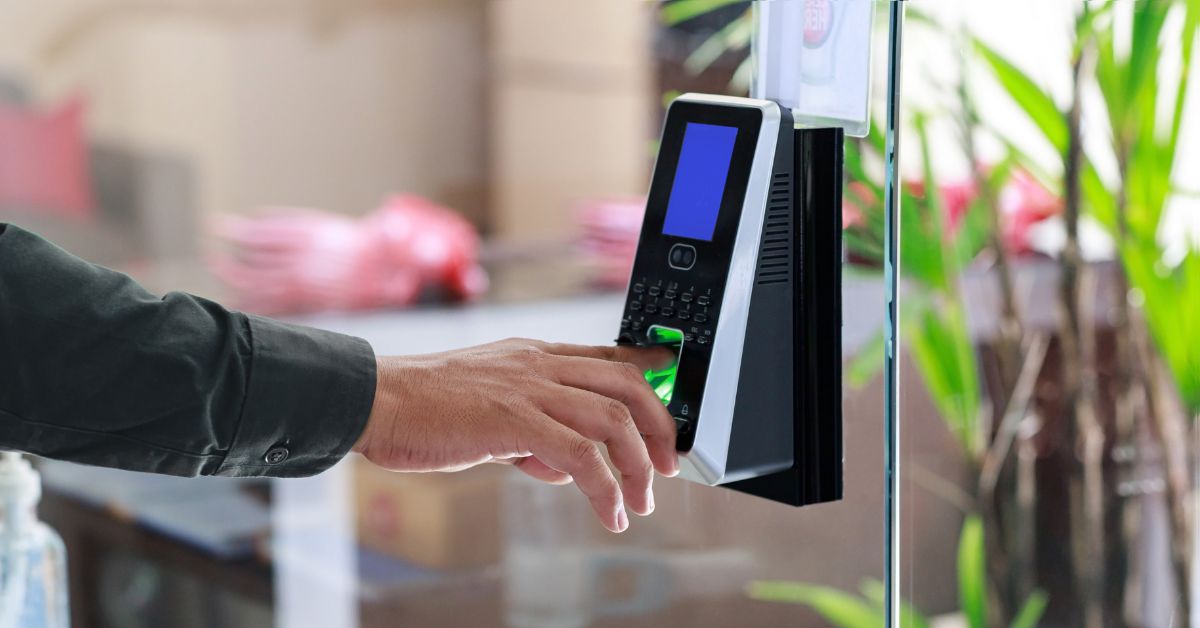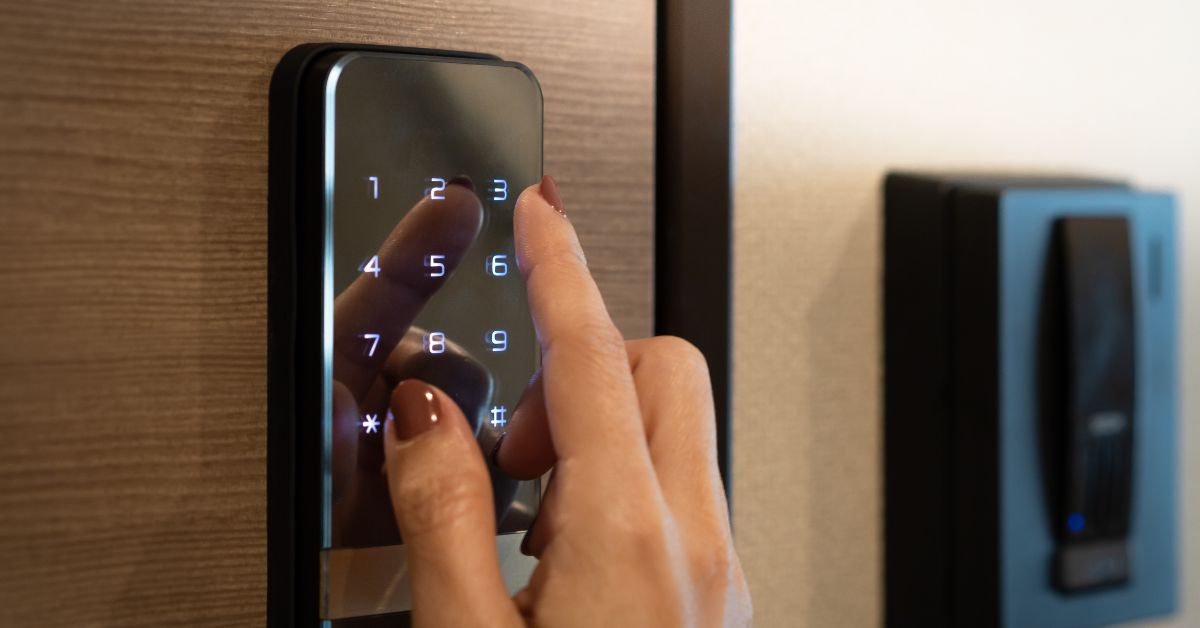5 Reasons You Should Upgrade to Electronic Door Locks

Understanding Electronic Door Locks
Electronic door locks combine technology with traditional locking systems. They allow access via keypads, access cards, or biometric scanners. The lock engages or disengages based on verified credentials, ensuring only authorized entry.
Many models connect with smart systems, offering remote management and monitoring through apps or centralized platforms. This integration of technology and functionality provides businesses with robust and modern security solutions.
Advanced Authentication Methods
Electronic door locks redefine security through advanced authentication methods that surpass traditional locks. These systems use encrypted access codes and biometric technologies to safeguard entry points.
Advanced methods deter unauthorized access and streamline the verification process, ensuring that sensitive areas remain secure. For businesses managing sensitive data or valuable assets, these features provide an essential layer of protection that traditional locks can’t offer.
Real-Time Monitoring and Tailored Security Solutions
Electronic locks empower businesses with real-time monitoring capabilities. Managers can track who enters specific areas and when. This feature is essential during audits, where access data can highlight compliance and pinpoint security lapses. Through this technology, companies maintain control over their premises.
Moreover, the versatility of electronic locks allows for tailored security solutions that meet unique business needs. Whether a company requires multi-level access control or time-sensitive entry restrictions, these systems adapt to specific requirements.
A tech firm, for instance, might grant different access levels for personnel versus administrative staff, ensuring that sensitive projects remain confidential. This customization enhances security without complicating daily operations, allowing companies to protect their assets effectively.

Convenience and Flexibility
Companies should upgrade to electronic door locks because they’re convenient and flexible. Employees enjoy the ease of entering premises without fumbling for keys, while businesses gain the ability to adapt access without physical key replacements.
A restaurant chain, for instance, can update access codes for staff across multiple locations with just a few clicks, streamlining operations and maintaining security across its network.
Administrators can adjust access levels or revoke permissions from anywhere, ensuring quick responses to changing security needs. Imagine a consultancy with offices nationwide—a central team can manage access efficiently, reducing the need for on-site visits and aligning security measures with business demands.
Reducing Security Personnel Costs
Electronic locks for doors simplify access management, reducing the need for extensive security personnel. Technology handles access control, allowing companies to allocate resources more efficiently.
For a warehouse, this means you need fewer guards for monitoring, as electronic systems effectively manage entry and exit points. This shift allows companies to direct funds toward other critical areas, improving overall operational efficiency.
Initial Investment vs. Long-Term Gains
Businesses may hesitate at the upfront costs of electronic door locks, but the financial benefits unfold over time. Traditional locks require frequent rekeying and replacements, leading to recurring expenses. Electronic locks eliminate these costs, offering a single investment that pays off with reduced maintenance. Consider a large corporate office; each time an employee departs, rekeying costs add up. Electronic systems bypass this expense, providing a cost-efficient alternative that enhances security without ongoing financial strain.
Insurers recognize the enhanced security of electronic locks, typically resulting in lower premiums for businesses. They view these systems as a proactive measure, decreasing the risk of unauthorized access and potential claims.
Integration With Smart Systems
The locks have better integration capabilities and merge with security infrastructures and smart technologies. Companies enjoy centralized access control, which enhances security measures. An office complex, for example, can manage building access, surveillance, and fire alarms from a single platform, optimizing efficiency and ensuring cohesive security management throughout the premises.
Furthermore, electronic locks provide scalable solutions that evolve with business needs. Integration with smart systems means that electronic locks adapt easily as organizations implement new technologies.
Environmental Benefits
Electronic door locks contribute to energy efficiency, especially when companies integrate them with other smart building systems. They support automated processes that optimize energy use, such as adjusting lighting and temperature settings based on occupancy. For instance, a tech company with smart locks tied to its HVAC system can realize energy savings by automatically adjusting temperatures in unoccupied areas.
Furthermore, transitioning to electronic locks reduces the need for physical keys and related materials, minimizing waste. Traditional locks require constant key replacements and metal usage, contributing to resource depletion. Electronic systems eliminate this cycle. Overall, businesses today prioritize sustainability, and electronic locks align with these objectives.
Potential Challenges and Solutions
Adopting new technology can pose challenges, particularly in businesses where staff members must shift from familiar systems to advanced electronic locks. Resistance often stems from apprehension about learning new processes.
Comprehensive employee training programs address this, ensuring employees understand and efficiently use the new systems. Training sessions can familiarize the staff with features like biometric access, reducing hesitancy and promoting a seamless transition.

Gradual Implementation Strategies
An abrupt switch to electronic door locks may disrupt daily operations. A phased approach allows businesses to integrate these systems gradually, minimizing interference with regular activities. Companies can start with high-priority areas, such as server rooms or executives’ offices, and expand implementation over time.
Choosing Reliable Providers
The success of an electronic lock upgrade hinges on selecting reputable providers for hardware and support. Reliable vendors like DoorHub ensure systems function optimally and address any issues swiftly. Businesses should prioritize vendors with strong track records and comprehensive support services.
Ensuring Continuous Support and Maintenance
Ongoing support is essential for maintaining an electronic lock’s functionality. Regular maintenance checks, software updates, and responsive customer service address technical hitches promptly. Establishing a robust support plan with the lock provider guarantees quick resolutions to potential problems, maintaining security and operational integrity.
Update Your Security Today
At DoorHub, we understand the importance of protecting your business with reliable and advanced solutions. Upgrading to electronic door locks is a strategic step toward enhancing your security infrastructure, offering unparalleled convenience and control.
These modern systems tailor access protocols to fit your unique operational needs, ensuring that your assets remain secure at all times. As threats evolve, so should your security measures. Waiting can leave your business vulnerable, but acting now lets you protect what matters most. Trust DoorHub to deliver premium door hardware solutions that integrate with your existing systems.

Author
Michael Rega
Chief Marketing Officer and founding Member of DoorHub.com